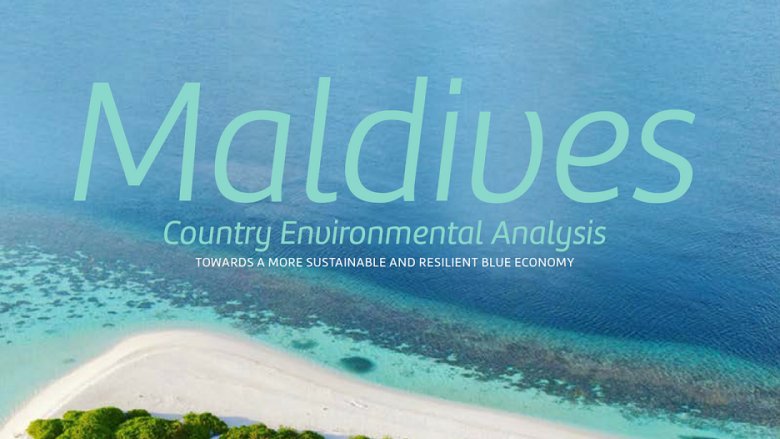Download the
Over the recent decades, the Maldives has witnessed remarkable economic growth, with real income per capital having doubled within a 20-year period. Development efforts have also led to significant improvements in physical capital (infrastructure and related services) and human capital (such as health and education).
However, this development path has placed significant pressure on its natural capital, notably its ocean, coral reef and coastal ecosystems. In addition to the cost to natural capital, there has also been a deterioration in fiscal and debt stability. Environmental degradation threatens key economic sectors like tourism and fishing and undermines the countries�� resilience against sea level rise, flooding and other coastal hazards.
The documents the main sustainable natural resource and environmental management challenges and provides recommendations for transitioning to a more sustainable, resilient, and inclusive blue economy.
Natural capital, and primarily blue natural capital, is the foundation of the Maldives�� economy. The tourism and fisheries sectors in the country critically depend on blue natural assets including coral reef islands and marine biodiversity, which contribute directly to about half of the GDP-value add and jobs in the country.
Natural capital is also the foundation of the Maldives�� resilience. Coastal ecosystems, in particular, coral reefs, protect the Maldives�� people and infrastructure against various coastal hazards, including sea level rise and floods. Without coral reefs, the Maldives would incur additional annual flood damages amounting to about 8 percent of the country��s GDP. Whether accelerated rates of sea level rise in the future will outpace the national island formulation process and whether corals can adapt to the changing ocean temperatures are critical existential questions for the Maldives.
The report identifies four primary sources of natural capital degradation in the Maldives. There are (1) current coastal development practices, (2) excessive ocean pollution, (3) unsustainable resource use, and (4) ocean heating (which is exacerbated by climate change).
KEY RECOMMENDATIONS
The report recommendations aim to provide a roadmap for the Maldives to navigate towards a more sustainable and resilient future.
1) Improve evidence:
- Strengthen surveillance mechanisms to assess marine ecosystem health
- Strengthening the monitoring of solid and liquid pollution and its impacts
- Increase local capacity to participate in monitoring efforts
2) Strengthen national planning
- Establish a marine spatial planning framework
- Foster integration with sectoral plans and strategic environmental impact assessments
- Regular updates of planning instruments
3) Enhance environmental governance and institutional capacity
- Strengthen environmental due diligence and risk management including comprehensive strategic environmental assessment (SEA) processes
- Capacity building of key agencies such as the Maldives Marine Research Institute and Environmental Protection Agency
4) Conserve high biodiversity areas
- Strengthen the marine protected area system by expanding coverage, prioritizing development of management plans and making use of alternative conservation models
- Safeguard coral reefs from pressures of coastal development and climate impacts
- Impose protective measures for mangroves
- Develop a medium-to-long term funding strategy for protected areas and implement it
- Invest in capacity of local councils for the management of protected areas and empower island and atoll councils in conservation
5) Implement sustainable coastal protection
- Preserve existing nature-based solutions through improved planning, mitigation of spillover effects and awareness raising
- Explore and evaluate nature-based solutions such as coral restoration and scale them up
6) Adapt natural resource use patterns
- Include the tourism industry in restoration efforts and invest tourism revenues in conservation
- Align sustainable tourism development with the carrying capacity and protected area management
- Explore fisheries diversification and alternatives to live-bait tuna fishing
- Use quantitative fish stock assessment to determine sustainable catch levels and incorporate into fisheries and marine protected area management plans
- Enhance monitoring, control, and surveillance efforts to prevent unauthorized fishing
- Conduct comprehensive fisheries value chain analyses to identify challenges and opportunities
7) Improve pollution management
- Build capacity and establish systems for decentralized waste management
- Increase share of reuse and recycling
- Improve wastewater management with wastewater management plans considering seasonal fluctuations
- Increase wastewater collection, treatment and disposal capacity
- Expand rain-water harvesting to improve freshwater availability and reduce runoff
8) Bridge the nature and climate finance gap
- Address the $10+ billion nature and climate finance gap through new financing approaches such as a biodiversity conservation trust fund or use-of-proceeds bonds (such as blue bonds), or Sustainability-linked bonds, or other innovative financing mechanisms.
- Increase private finance mobilization
The report also emphasizes the importance of behavioral changes. To nurture pro-environmental behaviors, the Maldives could invest in targeted awareness campaigns, integrate environmental education into school curriculums, and provide incentives such as tax breaks or recognition for sustainable practices. The Maldives also needs to address implementation gaps and enhance existing practices including infrastructure and capacity building, coupled with public education initiatives.

